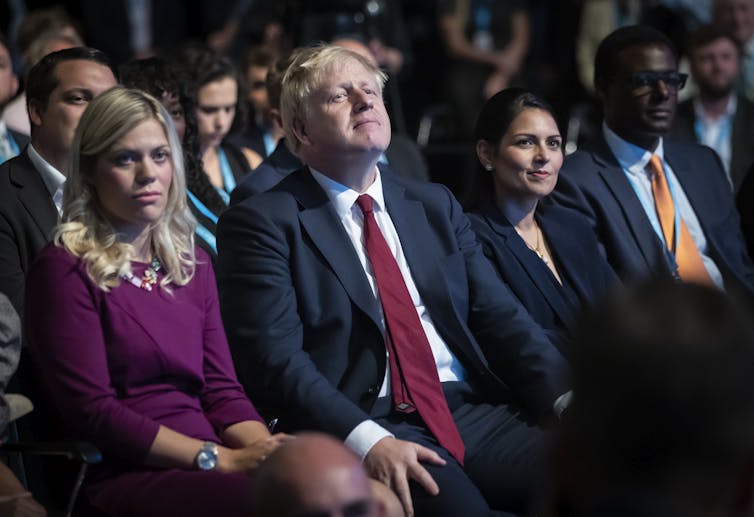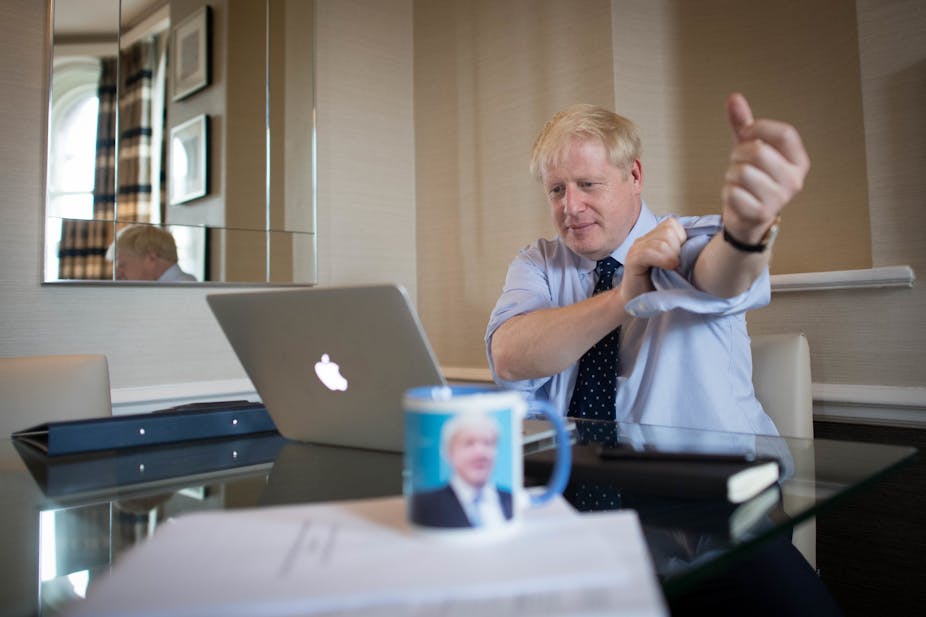The UK prime minister, Boris Johnson, is well known for his colourful language but he has come under criticism in recent weeks for using militaristic terms to describe Brexit, which some feel is inciting division.
He has said he’d rather “die in a ditch” than extend the Brexit deadline and condemned the legislation organised by MPs that would prevent him from taking the UK out without a deal as the “surrender bill”, as though to suggest Brexit is a war between the UK and EU. To add extra embellishment to this image, a Number 10 source briefed the Mail on Sunday that the legislation had been drafted by rebel MPs “in collusion” with “foreign powers”.
My research shows that this kind of language is far from being a general aspect of Johnson’s brand. It is, in fact, a very new tactic. He may have a longstanding interest in Winston Churchill, but before Brexit reached boiling point, Johnson hardly ever mentioned the war.
I’ve been examining the language Johnson used in written material authored between July 2015, when he became MP for Uxbridge and South Ruislip, and July 2018, when he resigned as foreign secretary from Theresa May’s government in protest over her Brexit deal. I’ve looked particularly at his use of historical and military imagery, before, during and after the Brexit referendum.
Given the kind of language being bandied around during the referendum, with Nigel Farage’s “battle bus” blasting out the theme from the Great Escape, we might have expected Johnson to have used many historical references in his writing. But he rarely did during this period.
Don’t mention the war? no problem
In his newspaper articles, Facebook posts, letters and transcribed speeches from this time, Johnson barely mentioned any wartime terms or phrases. Indeed, he only wrote one article between May 2015 and July 2018 which specifically referenced any wartime events, and he later apologised for its content, having compared the EU to Nazi Germany.
It was only after Johnson resigned as foreign secretary that he began, almost immediately, to reference World War II and use overtly militaristic terms in his writing. In his ministerial resignation speech in the House of Commons, Johnson argued that there had been a “stealthy retreat” by the May government from their Lancaster House plans and that Britain should “not be stampeded by anyone”.
Undoubtedly, resigning from the cabinet gave him more freedom to present his arguments in his own unique way but the contrast is nevertheless striking.
Temperatures were certainly high during the referendum but the approaching Brexit deadline on October 31 has led to a sense of desperation across the political spectrum. With neither side budging, consensus seems impossible and so the language has become more confrontational.

Then there has been the arrival in Downing Street of Dominic Cummings, the self-styled Svengali of the Leave campaign. His unflinchingly combative approach, while successful in the Brexit referendum, appears to have raised temperatures even further – although he himself describes the current situation as a “walk in the park”.
Another key difference may be that the government is running out of Brexit options. Where once Brexit supporters were able to talk of all kinds of different models for the UK’s future relationship with the EU – from a “Norway deal” to a “Canada option” – there is now only the choice between no deal, remaining or whatever deal Johnson hopes to strike with the EU at the eleventh hour. As the options become more stark, so does the language. As doors close, analogies become more urgent, more militaristic. Conservative MP Mark Francois cites his time in the Territorial Army, saying he “wasn’t trained to lose”. He and other members of the European Research Group call themselves “Spartans”.
Why it matters
For as long as politicians have been speaking to the masses, they have used military analogies to make their point. Terms referencing violence, war, weaponry and abuse have long been used, in a relatively benign way, to highlight dynamism and a determination to “get the job done”. These terms are equally a part of the daily lives of many people, and are largely meaningless. The violence they suggest is confined to the language used.
But it is clear that language matters, and it matters most in an uncertain, potentially dangerous political environment, such as exists in Britain at the moment. As a political environment becomes more febrile, the spectre of violence begins to become a reality.
MPs have warned as much, to Johnson directly at times. Labour MPs, most notably Paula Sherriff and Jess Phillips, have highlighted the murder of the MP Jo Cox in 2016 and warned that the warlike language being used by politicians was also being used in by the people sending them threatening emails and social media posts.
If language doesn’t matter, it raises the question of why the Conservative government have labelled the Benn Act “the surrender act” in the first place, and why they and others continue to use such violent and militaristic language.
For those who want to “win” the Brexit argument, language is a useful shorthand to sell your argument, to accuse the opposition of cowardice or collaboration with the “enemy” you have created. Johnson has deliberately changed his language since July 2018, using far more militaristic and warlike discourse than was evident before that date. And the difference is so stark that it indicates it was a deliberate rather than accidental change.

